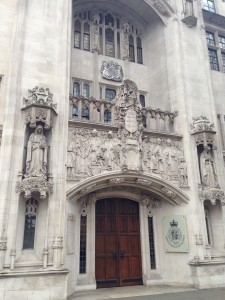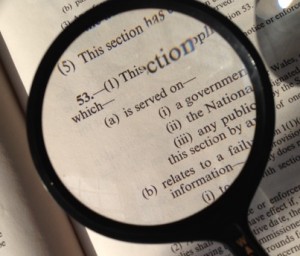FOIMan reflects on last week’s long-awaited publication of correspondence between the Prince of Wales and government ministers.

FOI stories are like buses. You wait ages, decide to walk, and then three or four drive past you. Last week I took a long-planned week’s holiday only for the new(ish) government to make significant appointments, the Court of Appeal to rule on vexatious requests, and of course for a 2005 series of FOI requests to finally achieve the disclosure they sought.
Consequently pretty much everything there is to say about Prince Charles’ letters to ministers in the Labour government back in 2004 has already been said. But I’m going to try and squeeze a few more drops of juice from the pith nonetheless.
Two points struck me. The first was the reaction to the letters. A panellist on Have I Got News For You? described them as “boring”. And that just about sums up everybody’s comments on them. Far from the skies falling in, or crowds storming Clarence House or Buckingham Palace calling for a republic, the letters confirmed what we already knew – Charles has strong views on certain subjects such as architecture and agriculture. He has expressed most if not all of those views publicly in the past, so all we now know is that he has said the same things to government ministers. Although, like many, I would prefer Royalty to keep its distance from government in anything other than a symbolic way, there’s no suggestion from this correspondence of anything improper.
Some people will argue that the Guardian’s campaign to procure this release was therefore a waste of time and money. It really isn’t. Evidence that there isn’t a problem is still valuable.
What was a waste of time and money was the government’s determined efforts to prevent release. Time and again we see these long battles to prevent disclosure of correspondence. And very often the offending missives are released and turn out not to be of the remotest interest.
Public bodies continue to battle to protect principles and conventions. This is despite the fact that their own FOI Officers, legal advisers, the Information Commissioner, the Tribunals and the courts constantly repeat that FOI exemptions are not designed to protect abstract traditions. To apply exemptions successfully you need to demonstrate that meaningful harm will be caused by the specific disclosure. Breaking conventions does not automatically cause meaningful harm – it may cause change, but that’s what FOI was meant to do.
All of this has been said before, and it leads me to my second point. The Supreme Court decision which led to this disclosure overturned the use of the ministerial veto by the then Attorney General Dominic Grieve. When Mr Grieve issued the veto, his explanation was that the letters were “particularly frank” and disclosure “could seriously undermine the Prince’s ability to fulfil his duties when he becomes King.” Now that we’ve had chance to read these letters, these statements – particularly the latter – appear ridiculous. How does this square with what we know about Mr Grieve?
Whatever your political persuasion, Dominic Grieve appears to be a sensible and rational man. He is a barrister, and especially since leaving office last year has not been shy to criticise government plans to replace the Human Rights Act with a Bill of Rights. When he gave evidence to the Justice Select Committee in 2012, he was invited to give his views on the introduction of an absolute exemption for cabinet minutes. He gave a reasoned explanation as to why that might not be a good change to make. Mr Grieve is not one of those politicians who opposes transparency on principle. He is thoughtful and considered on these matters.

So why was his justification of the veto so hyperbolic? I think I know this. Perhaps it isn’t very insightful but I think that it illustrates something of the position in which FOI Officers often find themselves. My guess is that Mr Grieve did not feel very strongly about Prince Charles’ letters. I suspect he came under pressure from others – Clarence House? Fellow Cabinet members? The Prime Minister? FOI Officers sometimes find themselves in disagreement with senior colleagues, and ultimately have to do what they’re told. Mr Grieve of course was a senior Minister, but may have found himself in a similar position nonetheless. We all have our seniors, and we all have to choose our battles. In the circumstances, I can understand why Mr Grieve may have felt this was not a resignation issue. He may well not even have bothered arguing.
When I was an FOI Officer and found myself in this position, I had to come up with arguments to justify the use of exemptions – even though I didn’t think they were justified. My arguments in such situations were undoubtedly weak and often exercised hyperbole. If challenged (which they rarely were), they would have fallen apart spectacularly. Perhaps this is how Dominic Grieve came to advance some uncharacteristically poor arguments in his explanation of the veto. He may well not have believed in them wholeheartedly from the start. So perhaps Dominic will not grieve his veto being overturned after all.


This article rases the question in my mind, is the freedome of information act merely a charade designed to give government officials an excuse to toy with tax payers money, knwing full well that people by and large take the stance that “because a decidsion has come from on high it is pointless even bothering to challenge it?”
Of course I might be in error, but when one looks at the wording of the exemption clauses themselves the language is to my mind sometimes somewhat wooly at best.
Hi Shaun
Thanks for the comment. I honestly don’t think that is true. Whilst there are certainly cases like this where disclosure of documents is much delayed and others where they never see the light of day (rightly or wrongly), there have been huge quantities of information disclosed under FOI. And often against the wishes of government. The veto itself has only been used 7 or 8 times to date. As for the Act being woolly – well, statutory language can be a bit tricky, but in many ways its woolliness has helped enhance openness – if there were clear rules on what had to be withheld and what to be disclosed, that would probably suit those wanting to prevent access more than those wanting to increase it. Hopefully sites like this help people understand how they work in practice, and reduce the mystery!
Hi Foiman,
Thanks for the reply. I stand corrected.point taken on both counts.